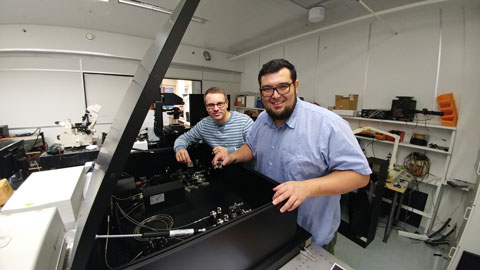Turku BioImaging Receives Significant New Funding for Acquisition of Top Equipment
Turku BioImaging has been granted funding from the FIRI programme of the Academy of Finland. One of the end uses of the funding will be a new 3D super-resolution microscope. The device will continue the super-resolution heritage of bioimaging in Turku: Stefan Hell began developing super-resolved fluorescence microscopy at the University of Turku and received the Nobel Prize in Chemistry for his work in 2014. The granted funding will enable the researchers at Turku BioImaging to examine incredibly accurate 3D images of live cells.

Pasi Kankaanpää and Camilo Guzmán besides the STED (stimulated emission depleation) microscope that already Turku BioImaging has.
– The 3D imaging of live cells at this resolution is rare even on a global scale. Although there is a large variety of super-resolution microscopes available on the market today, they can usually only be used for super-resolution imaging in 2D. The third dimension is then of normal resolution. In the future, we will be able to examine for instance single viruses and molecules in cells in 3D, says Project Manager Pasi Kankaanpää from Turku BioImaging.
Camilo Guzmán who also works at Turku BioImaging and is the manager of the Euro-BioImaging Finnish Advanced Light Microscopy Node says that the new device will help researchers examine molecules within cells accurately in the vertical axis, while previously this has mainly been possible only in horizontal axes.
– If our current devices help us see the different rooms within a house, the new super-resolution microscope will help us see what the people in the rooms are doing, Kankaanpää explains.
The new device will be used for different research purposes, including cancer research.
– Today, imaging is used in more than 95% of all biomedical research. The importance of imaging has increased steadily during the last 20 years, Kankaanpää says.
Finland to become a top-level service centre in the Euro-BioImaging network
Turku BioImaging is an organisation run by the University of Turku and Åbo Akademi University. It is also a member of the large European Euro-BioImaging network. The network currently consists of 28 nodes or service centres in 11 countries. One of these centres is located in Finland, and it consists of Turku BioImaging and bioimaging units in Helsinki and Oulu. The three organisations jointly applied for funding to make the centre a globally recognised top-level research service unit, and they were granted a total of approximately EUR 3 million of Finnish Research Infrastructure (FIRI) funding by the Academy of Finland. Turku BioImaging is responsible for managing the activities of the Finnish service centre, and it will receive one third of the funding.
– There will be collaboration between the units, and different devices will be purchased for each unit based on areas of expertise. All Euro-BioImaging applications from researchers wanting to use the devices in Finland will be sent to Turku, and we will then direct researchers to Turku, Helsinki or Oulu depending on where the appropriate equipment and expertise is available, Guzmán says.
Oulu BioImaging will use the FIRI funding to purchase an imaging device that is designed for mesoscopic (large) samples. In Helsinki, one of the end uses for the funding will be a combined electron microscope and light microscope. According to Kankaanpää, the new equipment and the stronger collaboration between the three units will make Finland's service centre one of the top bioimaging centres in Europe.
The granted funding will be used over the next four years, and Turku BioImaging aims to take the new 3D super-resolution microscope into use in 2018. According to Kankaanpää and Guzmán, the new equipment will not only enable researchers to utilise 3D imaging, but also make it possible to reduce the amount of laser light targeted at samples and speed up the imaging process. This will enable researchers to carry out super-resolution live imaging, which has previously been impossible. The equipment to be purchased will be customised based on the needs of Turku BioImaging, and the expertise of the unit's staff will play an important role.
– The funding we have received is strictly for purchasing instruments. Next we must consider potential sources of funding for covering personnel costs. The members of staff working at our centre are highly qualified and dedicated to their work. Without these people, even the finest equipment is completely useless, Kankaanpää says.
Erja Hyytiäinen